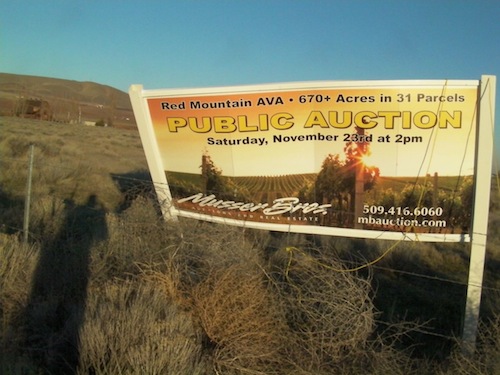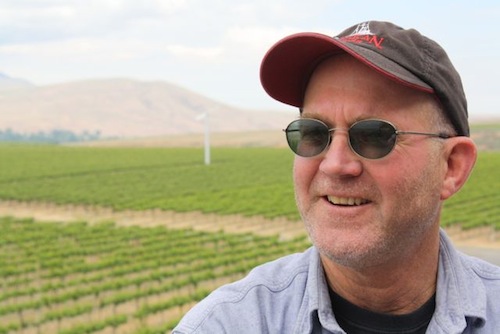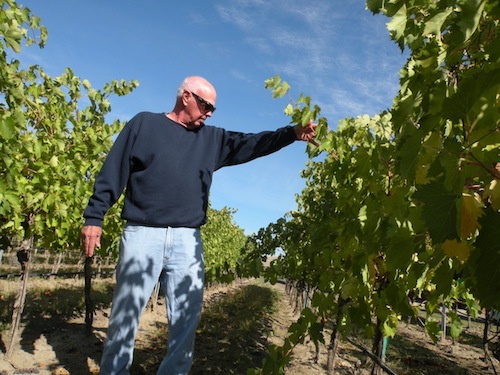
Saturday will be it: the last big land grab on Red Mountain.
On Saturday, the Kennewick Irrigation District will auction off 31 parcels of land totaling 670 acres. Of that, 518 are inside the Red Mountain American Viticultural Area. Washington’s smallest AVA is on the eastern edge of the Yakima Valley and is just 4,040 acres in size.
As there are about 1,400 acres of vines in the ground, this will leave precious little left that is plantable.
“This is absolutely the last Red Mountain land grab,” said Jim Holmes, owner of Ciel du Cheval Vineyard. In 1975, Holmes and John Williams planted the first grapes on Red Mountain. Williams and his family own Kiona Vineyards & Winery, just across Sunset Road from Ciel du Cheval.
Holmes and Williams paid $200 per acre for their land back in 1972. The parcels being sold Saturday are expected to fetch as much as $30,000 per acre.
“When there’s no more supply, that usually means good things for the people who hold the land,” Holmes said.
Economics of planting grapes on Red Mountain

Scott Williams, John’s son, runs the family operation and farms 240 acres of land on Red Mountain, including 20 acres of cherries. He shakes his head at the prices being bandied about, but he also understands why.
“It’s a small appellation and considered to be world-class,” Williams said.
Like Holmes, Williams is planning to go to the auction and watch, but he will not be raising his hand to purchase land. Indeed, he still has land left to plant. He began planting his estate Heart of the Hill Vineyard just below Col Solare in 2006, adding 20 acres per year. He has one section left to plant.
Larry Pearson, owner of Tapteil Vineyard, began planting his 33 acres on Red Mountain in 1985 and opened his winery in 1999. He agreed with Holmes and Williams that paying $30,000 per acre is a tough economic prospect. He pointed out that in addition to the price of the land, a potential vineyard owner also will need to pay about $12,000 per acre for irrigation – all before grapes are purchased and planted and trellising is added. He estimated that the total cost to plant a vineyard would be $60,000 per acre if the original land went for $30,000.
“I’ll be very interested to see what comes out,” he told Great Northwest Wine. “Some of this land isn’t all that grand for vineyard development.”
Pearson’s sentiment was echoed by other vineyard owners on Red Mountain.
The $30,000-per-acre estimate is based on the last large Red Mountain land auction, when the old Blackwood Canyon Winery land was purchased by Corliss Estates, which also owns Red Mountain Vineyards, next to Hedges Family Estate.
Holmes said a winery could make the economics work a little better because it would be able to grow the grapes, make the wine and sell it at a higher price.
Who will bid, and who won’t
Several interested parties are expected to be at the auction, including representatives from Duckhorn Vineyards in St. Helena, Calif., which last week told Great Northwest Wine that it is creating a new brand using Red Mountain Cabernet Sauvignon.
Representatives from Precept Wine in Seattle and E&J Gallo in Modesto, Calif., indicated their companies do not plan to participate in the auction.
One winery owner who is interested in adding to his Red Mountain land holdings is Keith Pilgrim of Terra Blanca Vintners. He has about 300 acres, of which about 100 are planted. He purchased his land in 1992.
“I’m ready to bid if something comes up,” he said, adding he knows some major wine companies also will be there. “We’ll see where things go.”
Pilgrim said that some of the land being sold that isn’t as suitable for vineyards would be perfect for a wine village, a concept that has been floated for Red Mountain. He added that accommodations and other amenities are badly needed.
“We could really use a hotel with 30 to 40 rooms,” he said. “That would be really helpful for our business.”
Williams added that if a proposed freeway exit for Red Mountain is built, it will go right past some of the parcels being auctioned Saturday, and that could make them rather valuable for commercial development.
Water key to developing Red Mountain AVA

The Red Mountain land is available and highly sought after because water is finally available. In fact, workers were installing irrigation pipe Thursday afternoon.
“It’s all been about water,” Holmes said. “There simply hasn’t been any water. For the past 20 to 30 years, it’s been nearly impossible to get water.”
One of Red Mountain’s newest landowners is Stacie Hamilton, who owns Hamilton Cellars in nearby Richland. She and her husband, Russ, purchased 10.5 acres of land in March, and they plan to plant 10 acres of Malbec, Cabernet Sauvignon, Merlot, Cabernet Franc and Petit Verdot. Famed Yakima Valley and Red Mountain grape grower Dick Boushey will be planting her vineyard, and Hamilton said the trellising will begin going in next week.
Hamilton said she’s glad she won’t need to go to an auction to purchase her land, nor does she need to worry about water rights because the land she bought has an existing well.
In addition to grapes, Hamilton also will have a tasting room, an event center, food service and yurts for overnight visitors. Construction will begin by the end of this month and should be completed by March or April, she said. She also plans to keep her current tasting room, about 10 minutes east of Red Mountain, open for the time being.
Hamilton said she hopes another 20 wineries will open on or near Red Mountain, making it an even bigger draw for wine lovers.
Holmes said that when water becomes more plentiful and new landowners begin planting, Red Mountain could end up with as much as 2,000 acres of vineyards – more than the vastly larger Walla Walla Valley currently has.

“Famed Yakima Valley and Red Mountain grape grower Dick Boushey will be planting HER vineyard.” Um, well, ok, maybe I just don’t need to know these intricate details, lol!
Yes, Mr. Boushey will be planting Mrs. Hamilton’s vineyard.